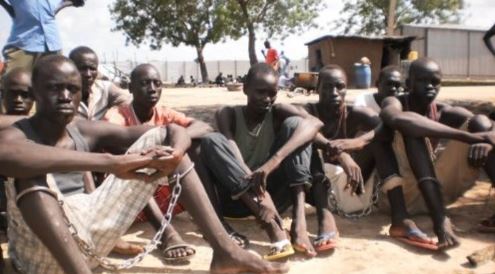Arbitrary arrests and ensuing detention of civilians remain a serious human rights concern in South Sudan, according to a joint report by the UN Human Rights Office and the United Nations Mission in South Sudan (UNMISS), a joint press statement said.
According to the new report, some 1,140 civilians were arbitrarily arrested and then detained for varying periods between January 2023 to May this year – among them at least 162 women and 87 children.
The report, which draws on verified and documented cases of human rights violations attributed to both state security elements and non-state armed groups, says that women and girls were subjected to arbitrary and unlawful arrests largely for refusing arranged marriages, seeking divorce, or for alleged adultery, in patterns of abuse reinforcing the use of gender as an instrument of control.
“Individuals, including persons with disabilities, have often been detained without ever being found criminally responsible and, in many instances, without even having committed any offense,” the report says.
Members of the political opposition or those perceived to be connected to them, and individuals indicating their intentions to actively participate in political processes, have also been arbitrarily detained.
“It is concerning that individuals have been arrested and detained – in many cases for alleged conduct that does not amount to criminal offenses,” said UN High Commissioner for Human Rights Volker Türk. “Such arrests and detention practices as outlined in our report detract from South Sudan’s ongoing efforts to reform the criminal justice system and improve the protection of human rights.”
“I call on the South Sudanese authorities to release all individuals arbitrarily deprived of their liberty, and to bring those responsible for such violations and abuses to justice,” he added.
According to the report, most of the arrests were carried out by government security agencies, namely the National Security Service, the National Prison Service, and the South Sudan People’s Defence Forces. Other arrests were carried out by the Sudan People’s Liberation Army – In Opposition and the National Salvation Front armed groups, as well as on orders of state and county officials.
The two UN bodies said that despite the challenges recorded in the report, the Government of South Sudan has made efforts to improve the human rights situation and address certain challenges to justice delivery, as set out in its response to the report.
With the support of UNMISS and other UN entities, the Government of South Sudan has taken measures to improve legal aid and justice sector reform in the country, among them the establishment of the Judicial Reform Committee, and the deployment of mobile courts and special courts. In its response to the report, the Government of South Sudan also expressed its willingness to conduct an independent investigation into the allegations of human rights violations contained in the report and to hold perpetrators accountable.
Nicholas Haysom, the Secretary-General’s Special Representative to South Sudan and Head of UNMISS said that the government’s willingness to investigate and ensure that those responsible are brought to justice is commendable.
“We urge them to also ensure that all victims of human rights violations and abuses receive the necessary support and reparation,” he said. “Building on past progress, I encourage the Government to continue its efforts to address the remaining challenges and ensure that justice delivery mechanisms are independent, effective, and accessible for all citizens.”
Haysom also called on the Government of South Sudan to promote and protect people’s rights to personal liberty and their civil rights, and to ensure citizens’ equal participation in public affairs in the lead-up to the forthcoming elections. He said the UN remained ready to provide South Sudan with the necessary technical cooperation for prison reform, in line with the United Nations Common Position on Incarceration.




